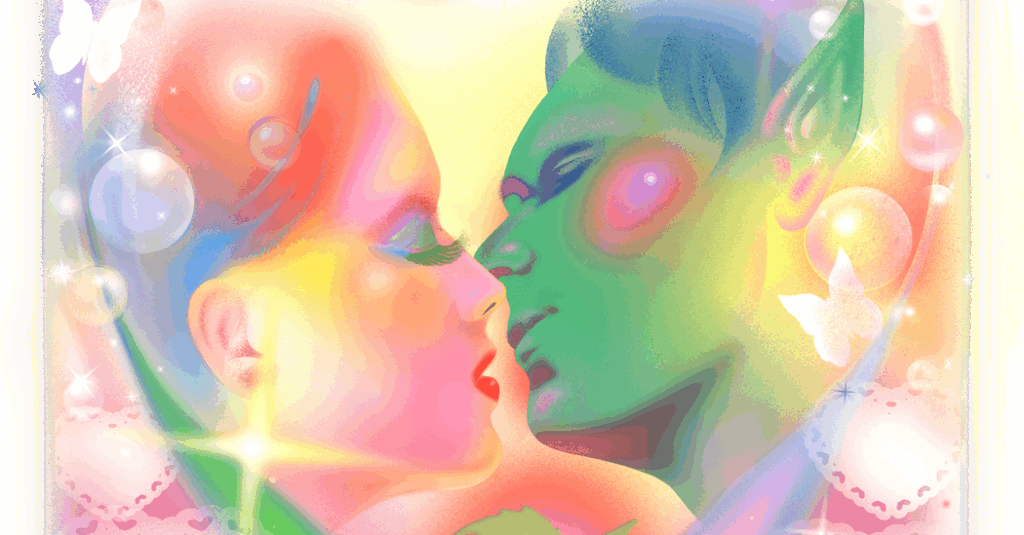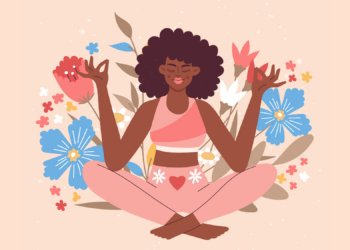Brittani Morton was 21 when she met her husband. That’s pretty young to meet your life partner, she said, but they got pregnant soon after and committed to making it work.
In many ways, the couple was happy. Ms. Morton loved her husband deeply and reliably orgasmed whenever they had sex, she said, but she still felt like something was missing.
“In my 20s, I wanted to be a good wife and a good mother and a well-respected woman,” said Ms. Morton, now 38. “Internally, that didn’t really line up with my natural curiosities and fiery sense of self.”
By the time she and her husband were in their 30s, parenting three children, she said intimacy “felt like a chore.”
Then, about four years ago, Ms. Morton’s Audible algorithm recommended a romantasy book — an erotic retelling of the Greek myth of Hades and Persephone. She inhaled it, blushing much of the time.
“I immediately texted my husband and was like, ‘Um, I think I’m reading the first smut book I’ve ever read,’” said Ms. Morton, who runs a children’s boutique in Portland, Ore.
These days, she counts herself among the millions of readers who are die-hard romantasy fans — a crossover genre that blends elements of fantasy (think fairies and dragons) with what is often very explicit sex. Fans quibble over the precise definition of romantasy, but in the strictest sense, the books are romances set in fantastical worlds.
And readers cannot get enough of them. Romantasy books — which tend to be written by female authors, for a largely female audience — sell millions upon millions of copies. The genre has been credited with propping up the dwindling fiction market. Passionate fandoms have also sprung up in places like BookTok and Reddit, where readers rhapsodize about their “book husbands,” swap theories and share recommendations. They also talk openly about yearning, sex and desire.
Because for some readers, romantasy offers more than a bit of escapism or titillation. It has become a vehicle for sexual reawakening.
Ms. Morton went from having sex with her husband about twice a month before she got hooked on romantasy to being intimate with him twice a day. They have explored different power dynamics in the bedroom, tucking a set of black fabric straps under their mattress so Ms. Morton’s husband, Aaron, can handcuff her. Recently, he got so caught up in a bit of role-play that he accidentally pulled the railing off their stairs.
Not all of that change occurred because she discovered romantasy, Ms. Morton said. She and her husband had both done deep dives into self-help nonfiction books. But much of their sexual renaissance has come from Ms. Morton immersing herself in fictional worlds where flawed and unashamed women have very hot sex — sometimes with a dragon-riding “shadow daddy.”
“It’s not that I’m fantasizing about fake men,” explained Ms. Morton, who has read 82 romantasy books so far this year, and is active on BookTok. “I’m connecting with these female main characters and the way that they feel wholly seen.”
Prioritizing Female Pleasure
People often debate whether romantasy is feminist, with critics pointing to concerns like the trope of the “fated mate” — the idea that characters are destined to be together — that tends to pop up in the novels. Or noting that the sexy male fairy whom readers are lusting over might actually be, well, a misogynistic jerk.
Still, some sex therapists say they appreciate how the books tend to prioritize female pleasure. Sex scenes in romantasy generally feature more foreplay than books and movies usually depict, said Vanessa Marin, a sex therapist in Santa Barbara, Calif. Some even make foreplay the main act.
“These books can be fantastic for women’s desire,” said Ms. Marin. She picked up her first romantasy — “A Court of Thorns and Roses,” a popular gateway to the genre — out of a sense of professional curiosity but was surprised by how transported she felt.
“We get so much socialization about the ‘right’ and ‘wrong’ ways that we’re allowed to express our sexuality,” Ms. Marin continued. “It gives this element of permission to women — just purely by the sheer numbers of how many of us are reading these books, and also the fact that we’re talking about them openly and not hiding them away.”
Romantasy’s wholehearted embrace of female sexuality has helped Lexi Ayala, 34, and her sister Nicole Holleman, 31, co-hosts of the “Fantasy Fangirls” podcast, assert themselves more in the bedroom — though to varying degrees.
For Ms. Ayala, the books are “self-care, my little escape,” she said, a reminder that she is not just a mother and a wife. Her husband sometimes expresses curiosity or makes lighthearted jokes about what she’s up to while she devours a chapter. (He has recently begun reading a few series, but they are really more her thing.)
Ms. Holleman, on the other hand, has been reading the books with her husband for years. Sometimes the pair will ask: “Should we try that? Should we try this?” Often, “it’s nowhere near as sexy as it was on the page,” she admitted. “But you’re laughing, and you’re connecting.”
More than that, the books have helped her tap into a newfound sexual confidence — as has the community that has formed around them. Modern romance novels, or “bodice-rippers,” have been around — and popular — for years. But the sheer dominance of the genre now, and the fact that women are reading and talking about the books so openly, feel like something new.
“One of the things that makes us readers shake our fists at the sky is when we hear, ‘Oh, it’s just dragons and sex, and sex with dragons,’” Ms. Holleman said. “It’s about rising up and finding your full power.”
Romantasy Isn’t All Roses
People often dismiss romantasy as nothing more than “fairy porn” or “lady porn” or even porn on paper. But proponents argue there are some fundamental distinctions between porn and romantasy — not least of which is that in some of the most popular series, readers consume thousands of pages for just a handful of truly steamy scenes. (Fans often offer unofficial “spice rankings.”)
Above all, romantasy allows for “exploration of domination and surrender and intensity — within a very protective framework,” said Erika Miley, a clinical sexologist in Spokane, Wash.
Unlike standard pornography, which she described as immediate and visual, romantasy tends to be internal, emotional and imaginative, Dr. Miley continued. “Porn bypasses that safety of the slow burn,” she said. “Whereas romantasy intentionally builds it.”
But while reading the books can serve as a powerful aphrodisiac, there are some aspects of them that give therapists pause. For one, the books can paint an unrealistic portrait of sex, Ms. Marin cautioned. On the page, intimacy is seldom awkward, often unfolds intuitively and almost always ends in orgasm.
And when you are spending hours upon hours reading about brooding and muscular warriors, devoted to their beloveds, your own living, breathing and imperfect partner may start to look a little milquetoast, added Elizabeth Earnshaw, a licensed marriage and family therapist based in Philadelphia.
Still, that feeling could help readers identify questions they might have about real-life sex and love, she said: Am I missing physical intimacy that feels novel? Am I craving greater emotional intimacy?
“If you’re reading and you’re thinking, ‘Oh, this is making me really disappointed. This is making me yearn for something I don’t have,’ I think that’s actually really important insight to have,” Ms. Earnshaw said.
Some therapists recommend that couples read the books together, like Ms. Holleman and her husband do, and discuss their takeaways.
But even when partners approach the conversations with care, not all couples are able to get on the same page. Reddit and BookTok are full of comments from women who say they tried to talk to their partners about things they’d like to try in the bedroom, and were dismissed or “kink shamed.”
Aaron Morton admitted that when his wife began devouring fantasy books, he was wary at first — even jealous of the male characters. But, he said, he began to ask himself: “‘Why is she reading it? What is she enjoying from it? And then what do I enjoy about it, and what are the things these guys are doing that I like, or I might want to embody myself?’”
“For a long time, I let a lot of my shame get in the way of our sex life, and that hurt us big time,” added Mr. Morton, 39, who was raised as a Seventh-day Adventist and believes Christian purity culture negatively affected his sense of sex and masculinity. But since romantasy has come into their marriage, he said, the couple’s sex life has “gone from PG to rated X.”
And that may be the biggest gift romantasy offers its fans: an opportunity to revel in yearning, desire and pleasure, without shame.
“To me, romantasy is freedom,” said Zai Sylla, 26, an actress and content creator with popular social media accounts dedicated to Black representation in books and movies. “It’s a permission that, ‘Girl, you can go as crazy as you want. You will not be judged here.’”
She often screenshots passages and sends them to her partner of five years.
Ms. Sylla, who lives in New York City, grew up in a household where sex was taboo, she said. Romantasy has become a way to reclaim her sexuality — a reminder that she is “worthy of feeling pleasure.”
“To see spicy themes, and a Black woman who is thick and curvy and being loved down, is an automatic unlearning,” she said. “Like, ‘Oh actually, this exists. I’m reading it.’”
Catherine Pearson is a Times reporter who writes about families and relationships.
The post Sex Had Become a Chore. Then They Started Reading Romantasy. appeared first on New York Times.




